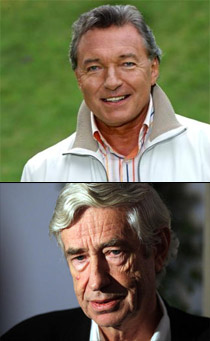
Olga Špátová is preparing a documentary about Jan Kaplický
 |
"I meet people who tell me that I should stop patting the people I film on the head. But a documentary filmmaker must have a clean conscience and joy in their work," says the daughter of two famous documentary filmmakers, Jan Špáta and Olga Sommerová, who has been behind the camera since she was sixteen.
"A documentary film is working with living people, with their privacy and emotions," explains the director and camerawoman, admitting that she carries her work home with her. When she was shooting the film about the "divine Kája," it was reportedly quite 'Gottified' at their home.
"I have to take Karel out of my heart now and switch to blob. It won't be such romance anymore, but politics, from the Castle to the Prague City Hall, from Milan Knížák to Pavel Bém," lamented Špátová, but she looks forward to the work, seeing it as a challenge.
As a counterbalance to the negative, the film will also feature "positive heroes": "Such as Václav Havel, Adriena Šimotová, Eva Jiřičná, or Jan Kaplický with his family and his team Future Systems. I look forward to them."
Some of the strongest voices against the proposal for a new National Library came from the Castle and the City Hall. However, President Václav Klaus and Mayor Pavel Bém reportedly did not want to express their opinions on camera.
"I want the film to be hopeful," revealed Špátová. In the near future, she is expecting additional shoots with the architect's wife and daughter, as he passed away in January, as well as editing the film. Špátová is also deciding whether the film will be one hour long or a bit longer.
The latest filming took place recently in Modena, Italy. Kaplický's widow, Eliška, was there for the laying of the cornerstone for the Ferrari car museum, which her husband designed. "I am glad that I can document positive events, like the one in Modena," smiles Špátová. "There were noisy Italians, a blessing priest, and great joy that modern architecture will be built there."
Paradoxically, it seems that Kaplický's dreams are starting to come true only after his death. What will happen to the Prague octopus, as the library project was nicknamed, is still a question. Although another famous Czech architect, Eva Jiřičná, who spent a significant part of her life with Kaplický, recently hinted that she would take it upon herself to advocate for its construction and might even take over the project.
"Architects are now afraid that the technological aspects might not go well now that the main architect has passed away," describes Špátová the struggles surrounding the project.
She hopes that the library will eventually stand in the Letenská plain and is looking forward to the realization of other Kaplický’s designs, such as the Volavka club near Konopiště or the concert hall in České Budějovice, nicknamed Ray.
In two years, Špátová has managed to collect an impressive amount of film material in shoeboxes. She says she carefully guards the unused footage. When asked about her future films, she shrugs. "I actually don’t have dreams that I would like to fulfill; for now, I just take advantage of the opportunities that life presents to me."
The English translation is powered by AI tool. Switch to Czech to view the original text source.
0 comments
add comment












